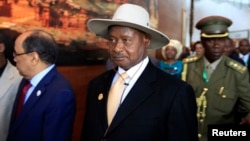An outspoken member of the African Diaspora has called on African leaders taking part in a Washington summit to meet with them.
Chika Onyeani, publisher and editor-in-chief of the African Sun Times newspaper and chairman of the Celebrate Africa Foundation, acknowledged he’s not speaking for the whole African Diaspora.
But, he said it remits an estimated $70 - $80 billion each year to Africa.
Onyeani said African leaders should give the Diaspora the same respect they give to other groups.
In July, he wrote to African leaders calling for an African Diaspora Town Hall meeting in Washington during the summit, but received no reply.
At the same time, he said, the African leaders attending the summit have made themselves readily available to organizations selected by the African Union office in Washington.
“Most of the time when they come they are always with the corporate people. They don’t really take the Diaspora into account. And, the thing is that the African Diaspora, especially continental Diaspora, is the most important constituency for the African presidents. This is a constituency that sends $70 to $80 billion a year to Africa. So, we are saying that they should be paying the same attention to us that they pay to all these corporate people who don’t contribute,” he said.
In his letter, Onyeani said the Diaspora was worried that the African leaders might ignore the Diaspora due to no fault of theirs while, at the same time, making themselves available to organizations such as the Corporate Council on Africa, which he says aims to profit from the African leaders’ visit.
“First of all, they are having a networking event on the 4th, which is $400 if you’re not a member of the Corporate Council. And then, there’s a dinner for Nigerian President Goodluck Jonathan, which is $200, and there’s one for Ghana’s president, which is $200, one for the Kenyan president, which is $200, and there is one which is exclusive only by invitation alone for President (Teodoro) Obiang (Nguema) of Equatorial Guinea,” Onyeani said.
Onyeani said all of these fees, plus $100 for a ministerial networking, amount to $1,300.
He said, while a lot of Africans in the Diaspora can afford the amount, they would prefer to remit that money back to Africa to support some the world’s fastest growing economies rather than pay to see their own presidents.
He admits Washington is a city where business or diplomatic deals are sometimes made over dinner.
“We are not saying they should not do it, but what we are saying is that at least they should devote one or two hours to getting together with the African Diaspora, whereby the ambassadors should fund such a meeting. We should not be asked to fund it,” he said.
Onyeani proposed to the leaders that African Union chairperson and Mauritanian President, Mohamed Ould Abdel Aziz, to organize an African Diaspora Town Hall meeting to be attended by five heads of state chosen by their peers and representing the five regions of Africa.
But, Onyeani said his proposal never materialized.
“I called the Mauritanian Ambassador so many times. I left messages for him. He never returned the call,” he said.
Onyeani said some of the issues that would have been discussed would have included legal recognition of the African Diaspora as the Sixth Region of the continent and an appreciation and encouragement by African leaders for the role the Diaspora is playing as the “largest investor in Africa’s economy.”
He said Africa needs an African Diaspora-centered president like former Senegalese President Abdoulaye Wade.
“When President Abdoulaye Wade would arrive in New York for the United Nations General Assembly meetings, while other African Presidents held their events in high-class expensive hotels like the Waldorf, his event would be held at the Schomburg Center for Research in Black Culture on 135th and Malcolm X Blvd in Harlem,” Onyeani said in his second letter.




